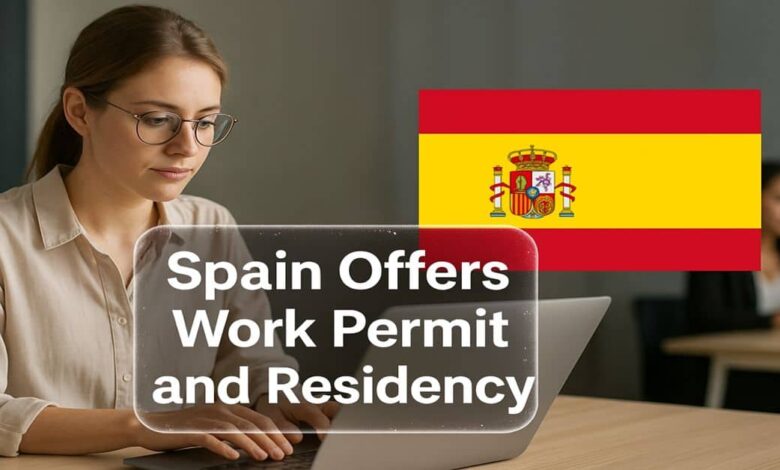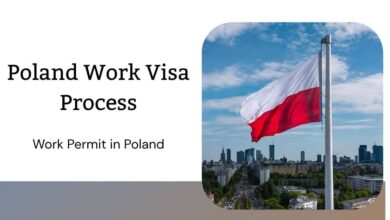Spain Offers Work Permit and Residency in 2026

In 2026, Spain Offers Work Permit and Residency, opening doors for both skilled and unskilled workers. This plan aims to legally recognize undocumented migrants, giving them the stability and opportunities they need to thrive.
Spain is facing a shifting demographic reality. With an aging population and fewer young workers entering the labor market, crucial sectors like agriculture, healthcare, construction, hospitality, and tech are experiencing shortages. Migrants have long filled these gaps informally, and now the government is offering a legal pathway that benefits both workers and the economy.
Why Is Spain Undertaking This Major Migration Reform?
Spain’s demographic landscape is evolving rapidly. The country’s aging population, combined with declining birth rates, has created significant challenges for the Spanish economy. As more people retire, there are fewer workers to support the economy, resulting in labor shortages in various sectors.
Key sectors facing acute worker shortages include:
- Agriculture: Migrant workers have long been vital in Spain’s agricultural industries, where demand for labor peaks during harvest seasons.
- Construction: Urban development projects have been growing steadily, requiring skilled and unskilled laborers to meet demand.
- Healthcare and Elderly Care: Spain’s aging population means that elderly care services and health professionals are in high demand.
- Hospitality and Services: Spain’s tourism and hospitality industries, critical to its economy, require a substantial number of workers, especially during peak seasons.
- Technology and Innovation: Spain’s growing tech sector has seen an increase in demand for highly skilled professionals, particularly in cities like Barcelona and Madrid.
To address these shortages, Spain is not just looking at immigration as a tool, but also seeking to modernize its labor market by providing new avenues for talent.
Regularization Process Work:
Under the new plan, 300,000 undocumented migrants will be granted the opportunity to apply for work permits and residency in Spain, provided they meet certain criteria. The government has designed this program to offer a pathway to legal recognition for individuals who have been working informally for years but without the security of legal status.
Check Also: Spain Work Visa Process
Steps for Migrants Seeking Regularization:
- Proof of Residence and Employment: Migrants will need to show they’ve been living in Spain for a certain number of years and working in Spain’s labor market, even if informally.
- Health and Criminal Record Checks: Applicants will need to pass background checks to ensure they do not have a history of serious criminal activity.
- Job Offer or Proof of Employment: Migrants who have not yet secured formal work will need to find an employer willing to sponsor them. The process will be streamlined to ensure swift employment for those eligible.
- Language and Integration Programs: The Spanish government is planning language and cultural orientation programs to assist migrants in adapting to their new environment.
- Renewal and Path to Permanent Residency: After 1-2 years, the work permits can be renewed, and after a period of legal residence, migrants may apply for permanent residency or citizenship.
Benefits of Residency in Spain:
Spain’s regularization of undocumented migrants presents numerous advantages, not just for the migrants themselves, but also for Spain’s society and economy.
| Benefit | Description |
|---|---|
| Visa-Free Travel | Enjoy visa-free travel to all 26 countries in the Schengen Area. This allows migrants to explore Europe for both work and leisure. |
| Education Access | Migrants and their dependents can access Spain’s exceptional public education system, including primary, secondary, and higher education at subsidized rates. |
| Healthcare Coverage | Migrants will have access to one of the most robust healthcare systems in the world. Spain’s public healthcare system is highly rated, ensuring affordable treatment. |
| Employment Security | Migrants will no longer need to fear exploitation in the labor market. With legal status, they will receive fair wages, labor protections, and access to worker’s rights. |
| Cultural Integration | Migrants will benefit from Spanish language programs, community integration efforts, and a growing international network, making it easier to settle in the country. |
| Access to Family Reunification | Migrants with regularized status can bring their family members to Spain through family reunification programs. |
| Work-Life Balance | Spain is known for its strong work-life balance, with generous vacation time, shorter workdays, and a high quality of life that supports family and personal well-being. |
| Pathway to EU Opportunities | Once a migrant obtains Spanish residency, they gain access to employment opportunities across the EU without requiring additional permits. |
Challenges and Potential Obstacles:
While the regularization plan brings many potential benefits, it is not without its challenges. Spain will need to overcome several hurdles in implementing this initiative effectively:
- Integration: Migrants may face challenges in integrating into Spanish society. Cultural differences, language barriers, and discrimination may hinder smooth integration. The government will need to invest in programs that foster inclusivity and provide cultural understanding.
- Administrative Challenges: The sheer scale of processing applications for 300,000 migrants annually means there may be delays and inefficiencies in the immigration offices. Spain will need to expand resources to handle the increased demand.
- Local Resistance: While many Spaniards support immigration, there may be opposition from local communities or political groups who believe that immigration will strain public resources. Building public consensus and ensuring migrants contribute to the economy is key.
- Housing and Infrastructure: The influx of new residents will put additional pressure on Spain’s housing market, particularly in major cities. The government may need to increase the availability of affordable housing options.
Conclusion:
Spain’s 2026 migration reform provides legal work permits and residency for undocumented migrants, addressing critical labor shortages across key sectors. It ensures access to healthcare, education, fair wages, and family reunification, while fostering cultural integration. Despite implementation challenges, the program offers stability, opportunity, and a brighter future for migrants and Spain’s economy alike.
Frequently Asked Questions:
Does Spain give work permits?
How can foreign nationals get a work visa in Spain? Foreign nationals must first have a job offer to get a work visa in Spain. Their employer will then be required to obtain a work permit to enable them to work legally in Spain. Afterward, they should apply for a work visa at the Spanish consulate in their home country.
Can I work in Spain with a residence permit?
The residence and work permit authorizes foreign employees to work in Spain. Spanish companies primarily hire individuals with this permit, which also includes provisions for graduates from Spanish universities with valid study permits.
Is obtaining residency in Spain easy?
All the months or years spent on a student visa or in a stay status will not be taken into account for obtaining PR. The requirements are simple. You just need your passport, a current residency card, a completed EX-11 form, clear criminal records for the last five years, and proof of payment of fees.




